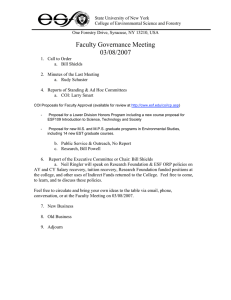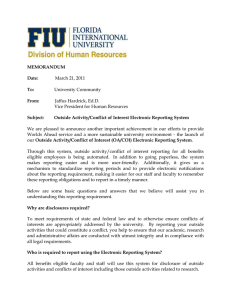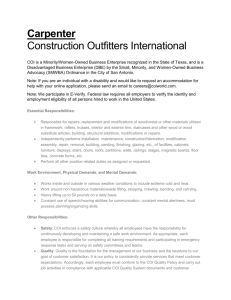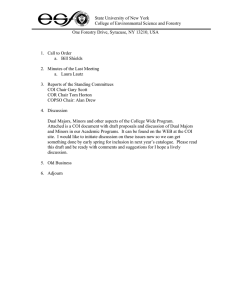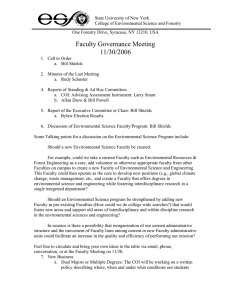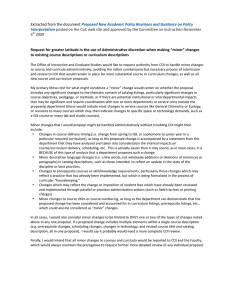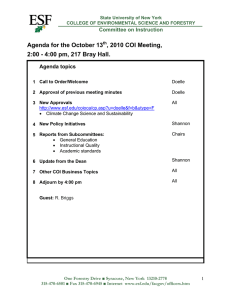This work is licensed under a . Your use of this
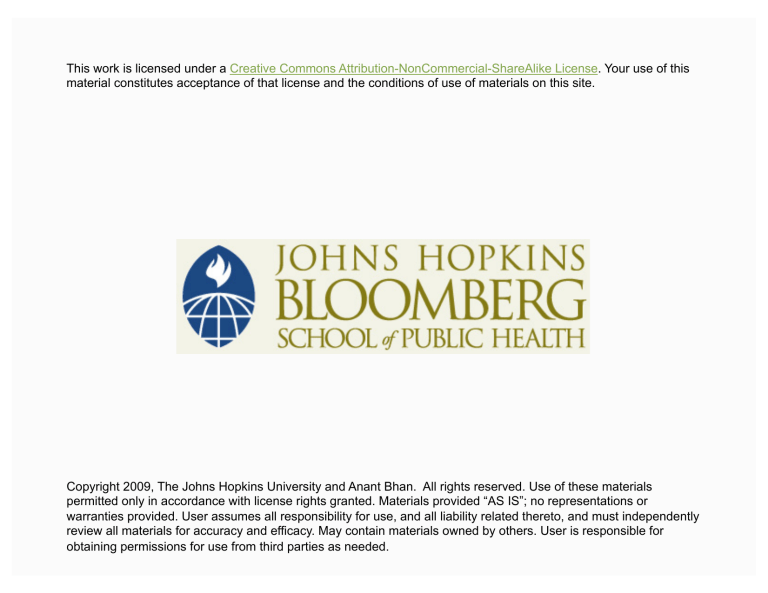
This work is licensed under a Creative Commons Attribution-NonCommercial-ShareAlike License . Your use of this material constitutes acceptance of that license and the conditions of use of materials on this site.
Copyright 2009, The Johns Hopkins University and Anant Bhan. All rights reserved. Use of these materials permitted only in accordance with license rights granted. Materials provided “AS IS”; no representations or warranties provided. User assumes all responsibility for use, and all liability related thereto, and must independently review all materials for accuracy and efficacy. May contain materials owned by others. User is responsible for obtaining permissions for use from third parties as needed.
Conflicts of Interest
Anant Bhan, MBBS, MHSc
Ethical Social and Cultural Program for the Grand
Challenges in Global Health Initiative
Objective of Session
Identify types of conflicts of interest, at what level of research these can occur, their potential consequences, and methods to minimize their occurrence
3
Points to Be Covered
What is conflict of interest?
Why is it important?
Types of conflict of interest
How can it be addressed?
4
Section A
Definition Overview
Definition of Conflict of Interest (COI)
A conflict of interest is a set of conditions in which professional judgment concerning a primary interest
(such as a patient’s welfare or the validity of the research) tends to be unduly influenced by a secondary interest (such as financial gain)
Thompson, D. F. (1993, August 19).
Understanding financial conflicts of interest. N Engl J Med, 329, 8,
573–576.
6
COI
Not a behavior of an individual or institution but a condition that prevails
7
COI
Many kinds of conflicts of interest, at all levels of research
Some obvious, many more subtle
Can usually avoid, or at least minimize
Requires thought and knowledge beforehand
8
Clinical Research
Increasing amount of funding from pharmaceutical companies (as compared to earlier when it came more from governments)
70% of money for clinical drug trials in the U.S. comes from industry
(Bodenheimer, N Engl J Med, 2000)
Growing number of CROs in India
Pressure to report positive findings because of business interests
9
Major Impetus for Industry/University Collaboration
Lead to concern regarding influence of industry in academic centers, both at the individual and institutional level
10
Relevance of COI to Research Enterprise
Potential for the conflict of interest to produce different results
Sources of funding for academic research—public to private sources
Risk of erosion of public trust
11
Why Do We Address COI?
To minimize the influence of secondary interests, such as personal financial gain, that should be irrelevant to the merits of decisions about primary interests, such as the care of patient, conduct of research or review
The second is to maintain confidence in professional judgment
12
COI: Levels
Individual
Institutional
13
Types of Conflict of Interest—Individual
Financial interests in outcome
Working on similar topic and has an interest in outcome (positive or negative)
Ideological position that views the study negatively/positively that biases decisions
Is not working but has an interest in the research being undertaken
(such as head of the department where P.I. works, etc.)
14
Types of Conflict of Interest—Individual
Financial interests in outcome
Working on similar topic and has an interest in outcome (positive or negative)
Ideological position that views the study negatively/positively that biases decisions
Is not working but has an interest in the research being undertaken
(such as head of the department where P.I. works, etc.)
15
COI: Individual
“Other sources of conflict are personal, political, academic, and religious and we believe that those may be just as potent as financial conflicts”
Smith, R. (1994, January 1). Conflict of interest and the BMJ.
BMJ, 308, 6920, 4–5.
16
Implications for Research
Affects
Consent process
Review processes
17
COI: Consent Process
Information provision
The person taking the informed consent has a vested interest in completing the research and not only the subject/participant
Possible solution—consent to participate in the research is obtained through independent persons not directly affiliated to the research
18
COI: Review Processes
Peer reviewing—individual affiliations and interests
Similar work in progress
Personal affiliations, etc.
Financial or other stake holding
IEC processes
Financial COI
Other issues similar to individual COI
19
COI: Institutional (def.)
When any of an institution’s senior management or trustees or a department, school, or subunit or an affiliated foundation or organization has an external relationship or financial interest in a company and that company itself has a financial interest in a faculty research project
20
Other Institutional COIs
Ethics committees themselves may be subject to institutional pressures to approve research activities in which the institution has a financial stake
Institutional stake in grant coming to institution
Extreme case—corruption, for example, bribing authorities for approval
21
Models of Managing COI
Prohibition, that believes that any relationship presents a COI
Disclosure and peer review (believes that COI are unavoidable and financial interests are the least scientifically dangerous)
22
